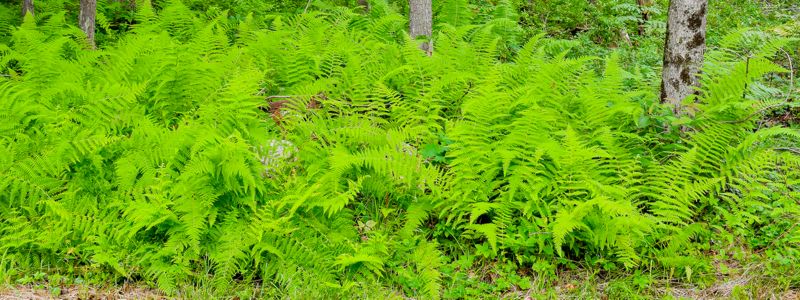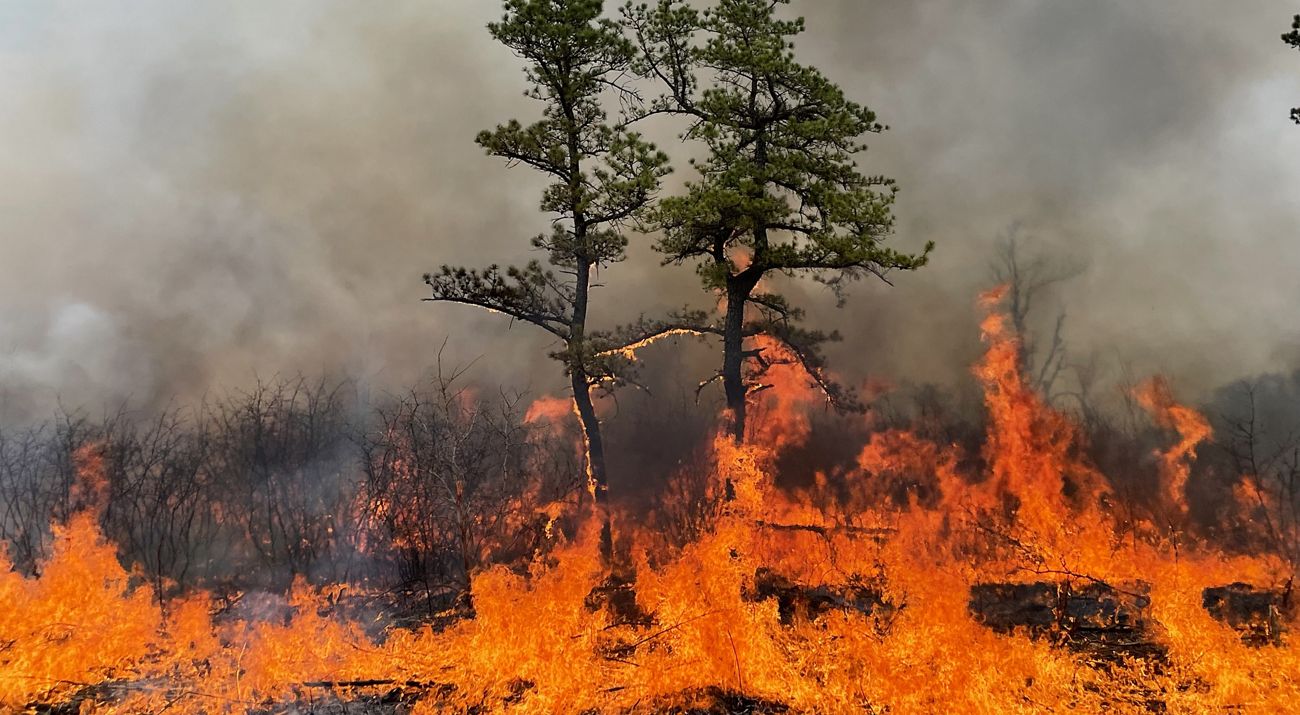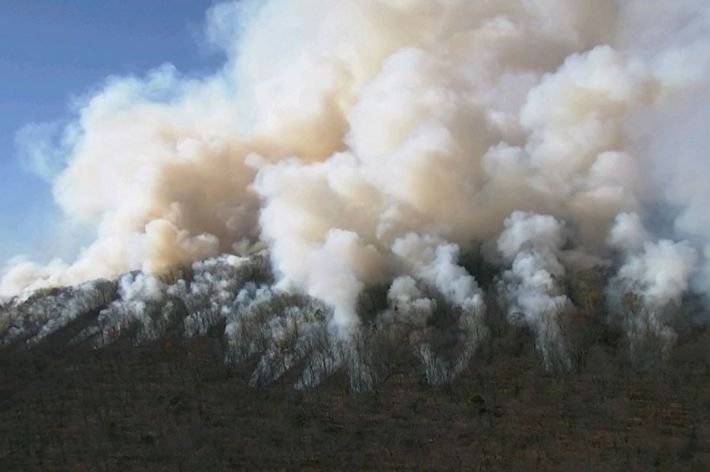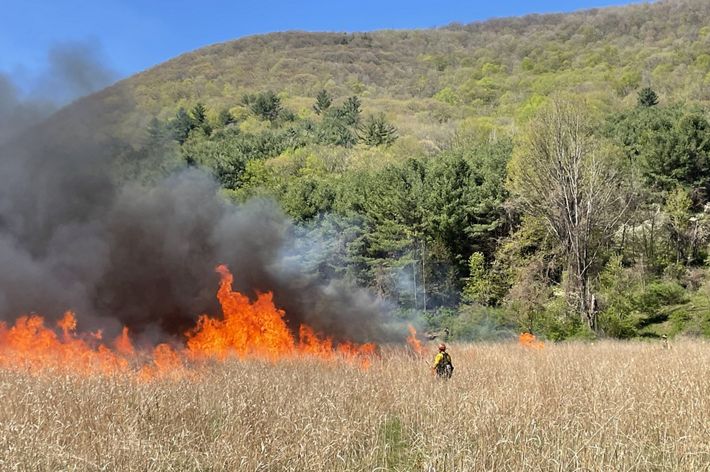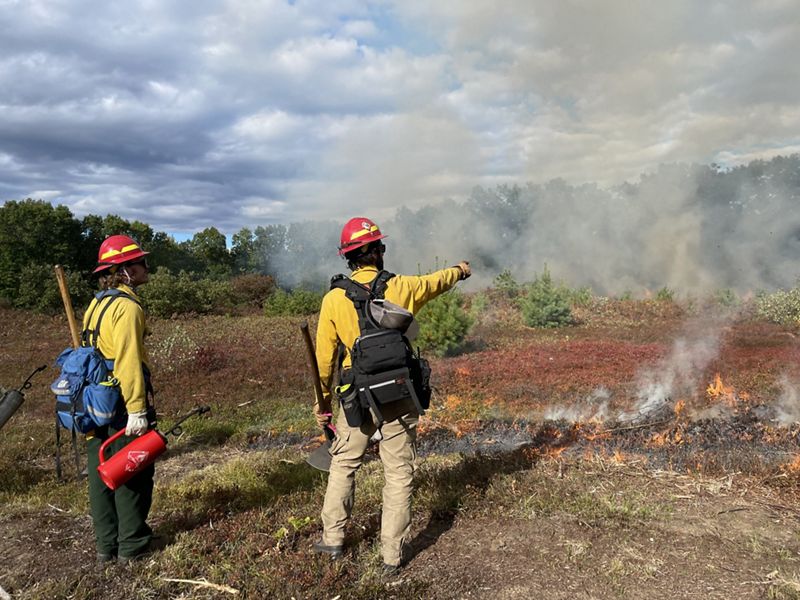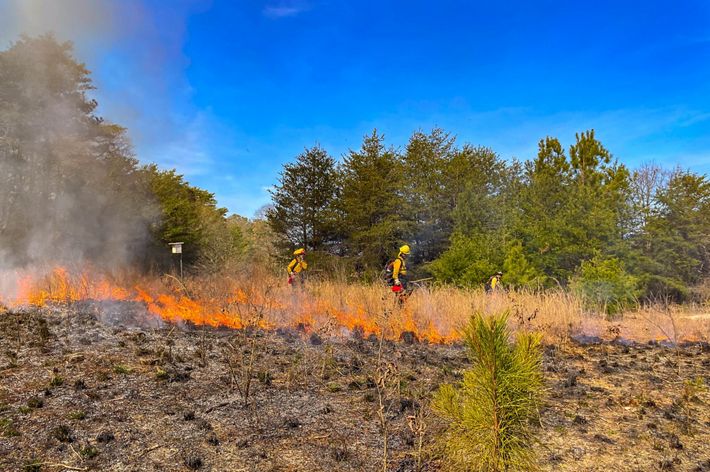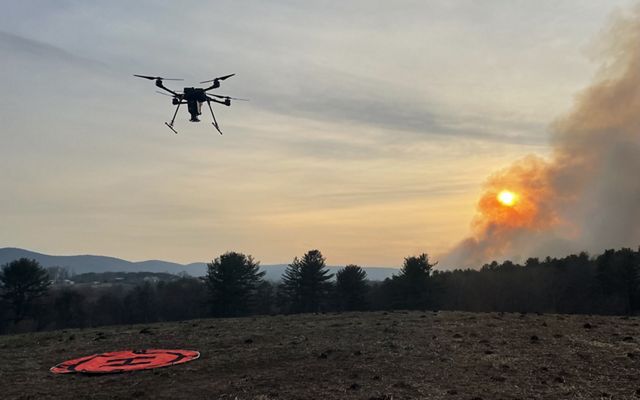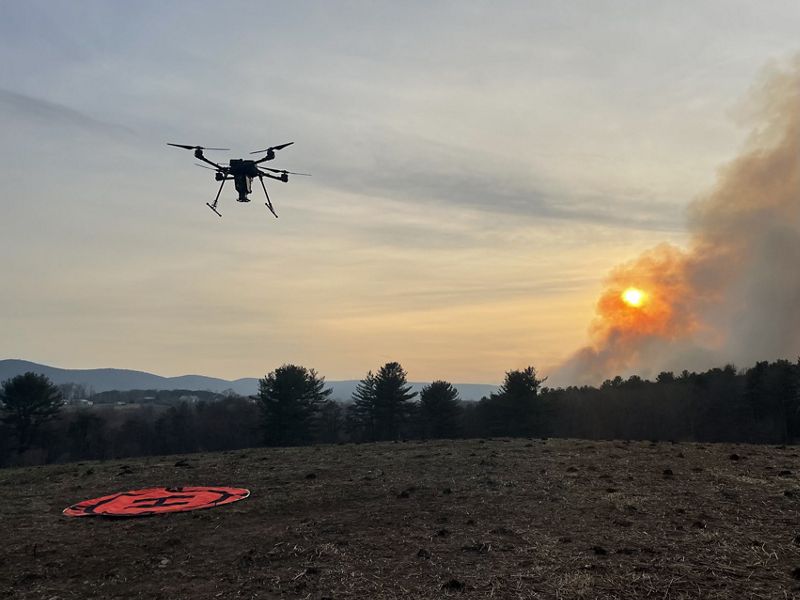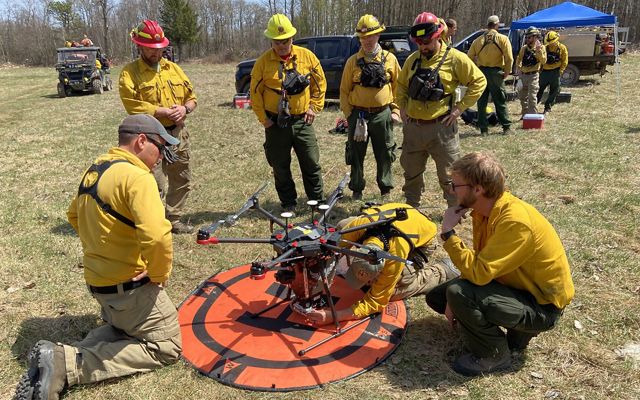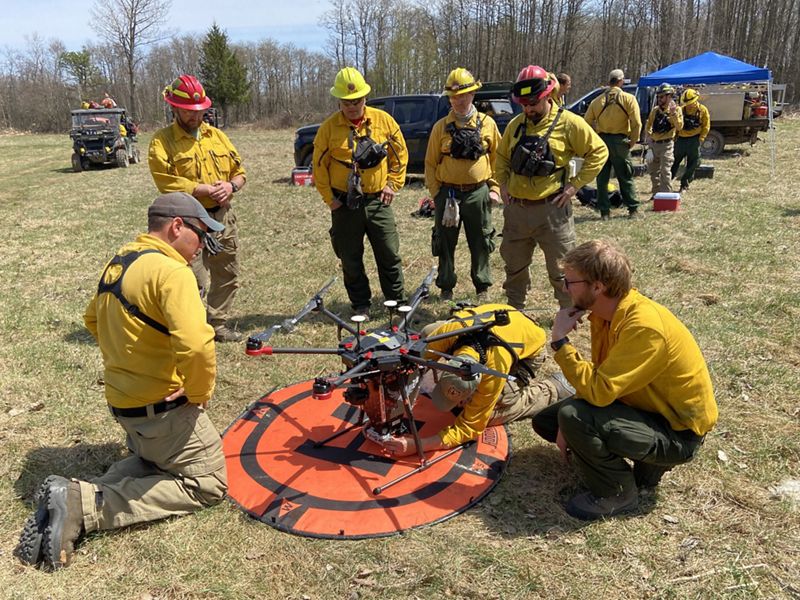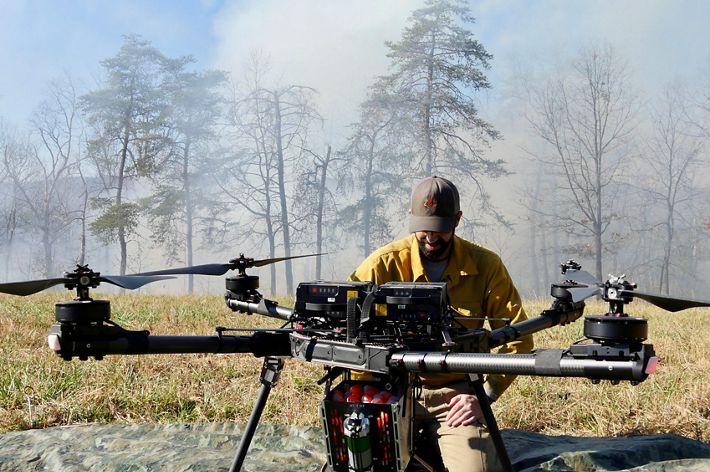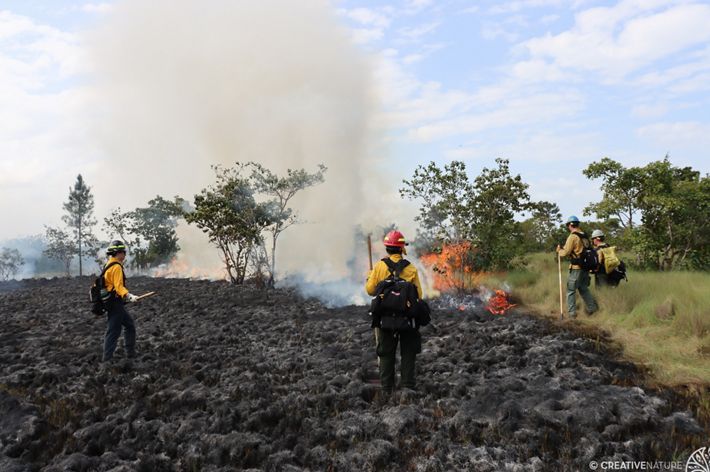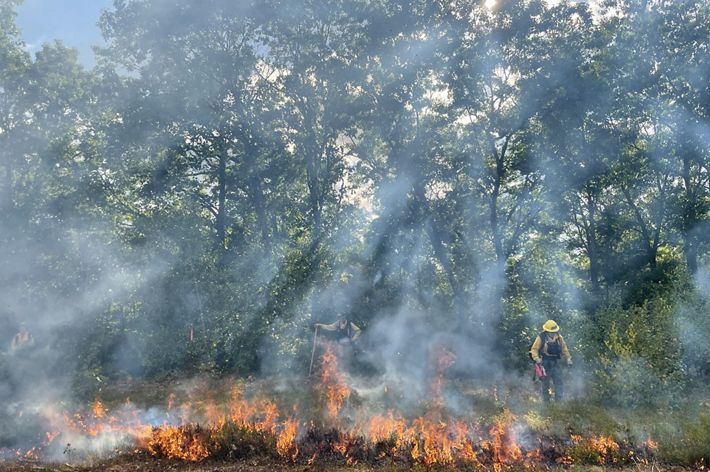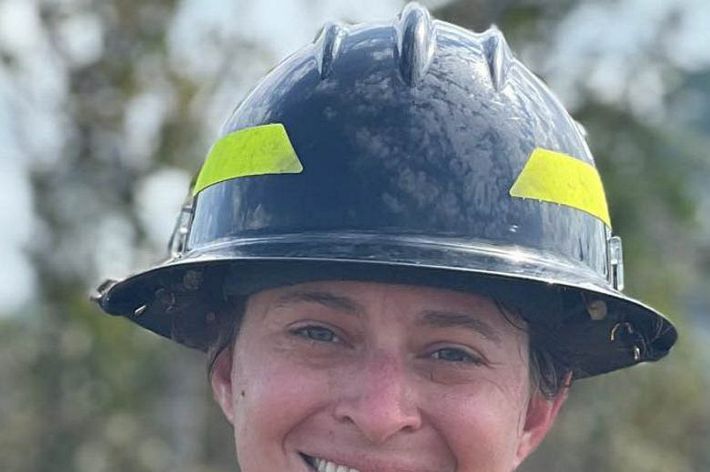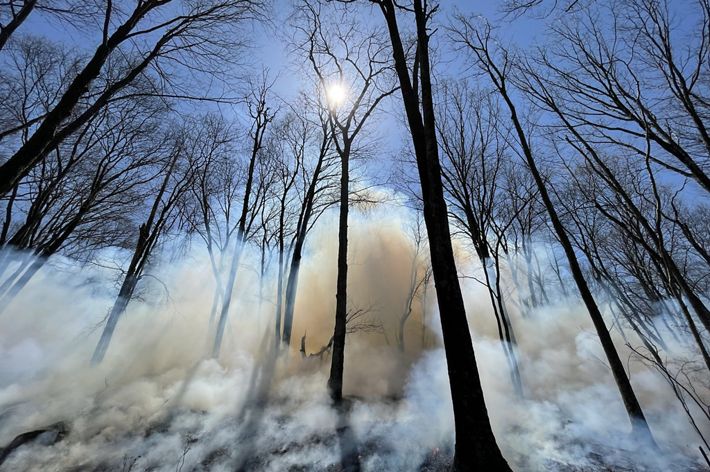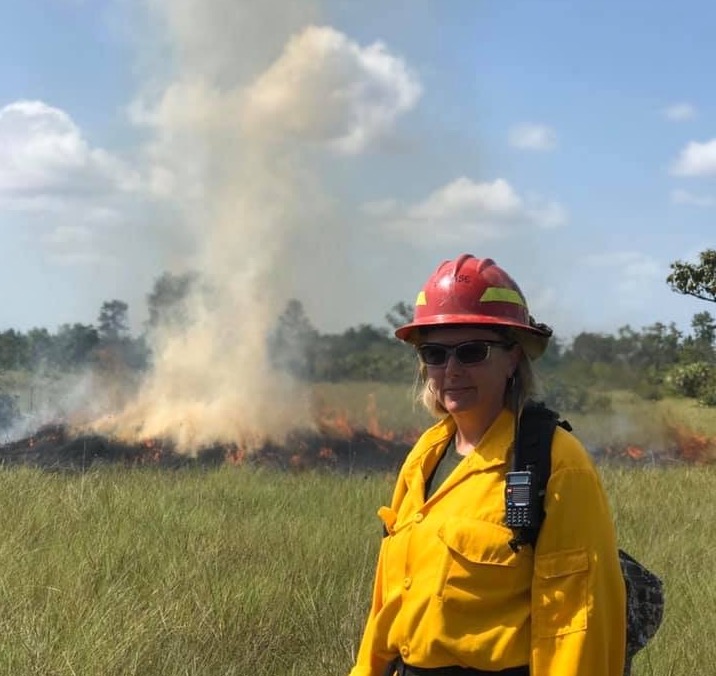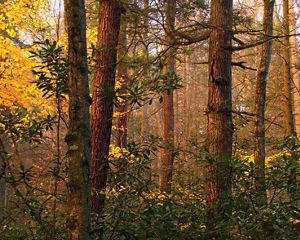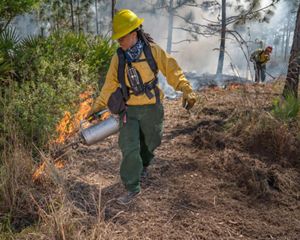Check out Jenny Case: A Pioneer in Good Fire
A story about TNC's Jenny Case, & her role as a trailblazer for conservation in PA.
Check out the storyFire has always been a part of the natural world and its influence has shaped the diversity of plants and animals across the globe. Pennsylvania and Delaware boast several landscapes that, over millennia, have been shaped by fire. Native Americans routinely introduced fire into the region’s forests, barrens, grasslands and wetlands out of an appreciation for the benefits of this important ecological process.
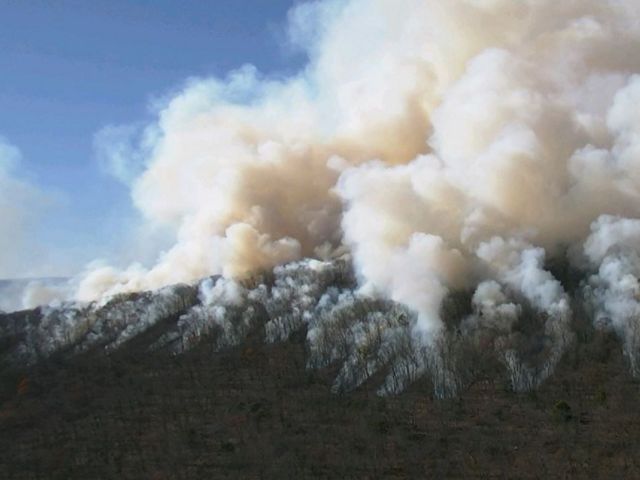
A century of suppressing naturally occurring fires has thrown our forests out of balance and caused an abundance of organic matter that has accumulated over many years. When wildfires occur in overgrown forests, they are larger and more intense, putting plants, animals and human communities at risk.
The science is clear: controlled burns (also called prescribed burns) are a proven way to restore our forests. By managing the natural process of fire on the landscape instead of preventing it, we can improve habitats for native plants and animals and reduce the risk of out-of-control wildfires.
The Nature Conservancy uses controlled burning as a key conservation strategy at several of our nature preserves in Pennsylvania and Delaware. Our fire crews regularly work with other TNC teams across state lines and our already notable network of public and private burn partners continues to grow. All prescribed burns are thoroughly planned and carried out by our trained experts. Weather conditions are monitored starting days in advance and on-site until the fire is out to ensure the safest burn possible.
Restoring Habitat
Many species of plants and trees have evolved to be fire-adapted and may not grow or disperse their seeds until after a forest has burned. With natural wildfires suppressed for so long, rare plants and animals that depend on periodic fires could disappear. Fire management goals may include reducing invasive plants, eliminating woody encroachment into native grasses, keeping the forest floor open by reducing tree and sapling density and providing beneficial habitat for species such as grassland nesting songbirds and insects.
The specific pattern of fire—how frequently it burns, how hot it burns and during which season—dictates the types of plants and animals that will thrive in a given area. Using fire in the right places and at the right times can mitigate dry conditions and enhance healthy forests that attract diverse wildlife, support local livelihoods and help reduce threats to public safety.
Stephen Ruswick, a Land Steward & Fire Specialist based out of TNC’s Hauser Nature Center in northeast Pennsylvania, says fire is a valuable conservation and management tool.
“Forests and nature in Pennsylvania are changing and need our help,” he says. “There’s recognition that if we have a hands-off approach to our lands, then we will end up with a homogenous forest filled with the same few tree species, which doesn’t support much life or animal diversity and is prone to collapsing if those last species start to get killed by invasive pathogens.”
Quote: Stephen Ruswick
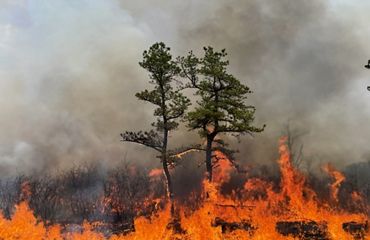
While fire isn’t a cure-all, it can abate many invasive species issues, increase plant diversity and resilience to future climate shocks and provide forage for endangered and flailing insect, bird and animal populations.
Delaware Stewardship Manager Natasha Whetzel says she’s particularly excited about the habitat improvements at Ponders Tract thanks to burning and tree thinning. She visited the site in the spring of 2023 with Delaware’s state botanist, Bill McAvoy, surveying the increased plant diversity.
“We didn’t find any rare plants during this visit, but Bill said the suite of species that we have growing together at Ponders is rare in Delaware, and that he’s never seen so much lyonia mariana [staggerbush] in one place. We both agreed our plant diversity is in the understory and that’s why sun and fire are critical to management.”
Partnerships
The prescribed fire communities in Pennsylvania and Delaware continue to grow with TNC recognized as a leader and trusted partner. Jennifer (Jenny) Case, previously the Fire Manager for TNC in Pennsylvania, served on the board of the Pennsylvania Prescribed Fire Council, which features representatives from 21 different organizations. Meanwhile, Delaware Stewardship Manager, Natasha Whetzel, serves as council Vice Chair on the Delaware Prescribed Fire Council, consisting of 14 distinct conservation organizations in the First State.
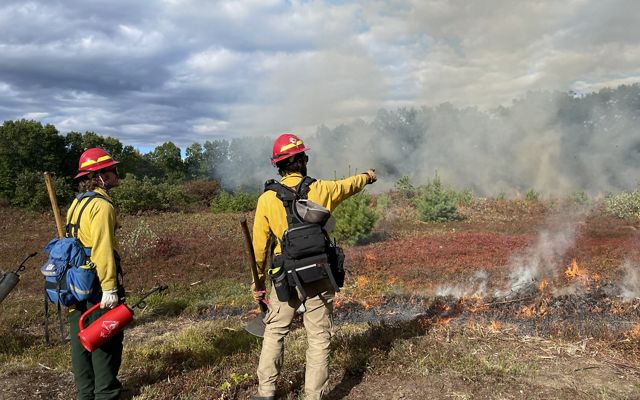
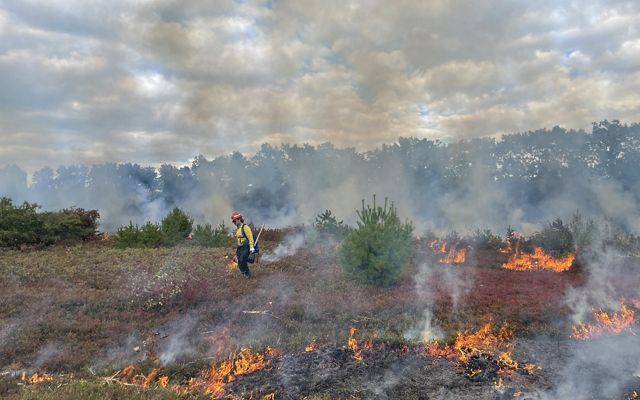
For the last two years, Case has been working with Pennsylvania-based staff from the Natural Resources Conservation Service (NRCS) to provide the technical training they need to build prescribed burns into land management plans developed for private landowners. We’ve also been working to train private contractors and landowners thanks to funding from an NRCS grant.
“It’s a really exciting time for prescribed fire in Pennsylvania,” Jenny explains. “For many years, we had to fight against perceptions that all fire was bad, but it seems like those attitudes are finally changing.”
Quote: Jenny Case
Our small but mighty team of fire practitioners at TNC is having an outsized impact across the state. We’re proud of the work we’ve done, and the partnerships we’ve established and grown to get where we are today.
TNC is also partnering with the Bureau of State Parks (BOSP) to build its staff’s capacity to use prescribed fire as a management tool. The BOSP owns and manages 125,000 acres within TNC’s focal landscapes for climate resilience and biodiversity in the Keystone State.
Implementing prescribed fires for BOSP includes developing burn plans, serving as burn boss and overseeing burn-day activities, pre-burn monitoring of weather conditions and delivering post-burn reporting. Additionally, TNC will provide a drone and drone pilot to ignite one of the prescribed burns. This valuable tool significantly increases implementation efficiency and burn crew safety.
The collaboration between TNC and BOSP advanced significantly in 2022 when TNC planned and led a burn at Nescopeck State Park in Luzerne County. Both organizations are now looking to invest in future burns and training opportunities at Pennsylvania state parks in 2023.
The Delaware Prescribed Fire Council
TNC is a director organization of the Delaware Prescribed Fire Council (DPFC), and Delaware Stewardship Manager, Natasha Whetzel, acts as the council Vice Chair. The DPFC works to protect and promote the Delaware prescribed fire communities' right to responsibly utilize prescribed fire; and to exchange information, techniques and experiences as well as promote public understanding of the importance and benefits of prescribed fire as a natural resource management tool.
The goals of the Delaware Prescribed Fire Council include:
Technology
Technology is increasingly a game changer for prescribed burns. Traditionally, burn crew members light fires using handheld drip torches, requiring staff to walk through the middle of a burn unit to get fire on the ground. This practice leaves crew members—who are wearing heavy equipment on their backs—exposed to hazards, especially in steep or dangerous terrain. It also limits how quickly the fire can be set.
With the IGNIS drone, burn crews are primarily responsible for burning and monitoring the perimeter of the burn unit, while the drone drops small incendiary spheres known as “dragon’s eggs,” which start the blaze. The drone is piloted by a specially trained member of the fire team who remains in coordination with the burn boss throughout its use.
Drones allow for more precision once a fire begins. Case recalls a prescribed burn at Ponders Tract in Delaware in 2022 where the smoke wasn’t rising off the ground and became a safety concern on a road adjacent to TNC’s property.
“I asked the drone operator to drop a few more of the dragon’s eggs in the unit to bring up the heat in order to lift the smoke,” says Jennie. “And within a matter of 10 or 15 minutes, the problem was being resolved and the smoke was lifting. We never would have been able to do that by hand so quickly and easily. The drone helps make our jobs a lot easier.”
Chase McLean of the TNC’s Maryland/DC chapter has been training Pennsylvania-based Ruswick on operating the ignition drone, which will allow for this technology to be put to use more frequently in Pennsylvania and Delaware.
“I think ignition drones are really going to revolutionize our ability to conduct prescribe fire: they are incredibly precise, quick and safe,” Ruswick says. “Last year, I piloted the drone for the 150-acre burn on Dan’s Mountain in western Maryland, where there is some tricky topography. Without the drone, there are safety concerns for staff—for instance, if the wind switches direction or someone breaks a leg on a steep rocky slope, personnel could be in the fire’s path. Whereas the drone can do all of this from the sky about 10 to 20 times as fast as a group of five people.”
Trainings
In the summer of 2022, Ruswick participated in a prescribed fire training called the Maine TREX (Training Exchange), where he was mentored by fire leaders from Florida, Oregon and Rhode Island. He was training as an Engine Boss, which is the position in charge of a fire engine and several firefighters.
“While the training took place in Maine, I’ll be able to carry over much of the place-based knowledge to our similar ecosystems in Pennsylvania and Delaware,” Ruswick says. “Where I am in the Poconos, there is the unique Long Pond Barrens ecosystem that has many of the same benefits and challenges as those in the Wellsboro Barrens in Maine. Barrens ecosystems can produce intense fire behavior, so learning how to control this behavior or dealing with wind shifts or other complications prepares me for dealing with unexpected conditions regardless of where I am burning.”
Natasha Whetzel began her work in the field of prescribed fire in North Carolina in 2012. Thanks to her dedication, she spurred the return of fire to TNC’s lands in Delaware starting in 2017. Natasha continues on her path to become a certified burn boss, which requires tremendous amounts of training and experience in a variety of landscapes and conditions.
In August 2022, Natasha traveled with two other TNC fire staff to Hoopa, California, to work and train with the Hoopa Fire Department for ten days. Natasha needed experience with fighting wildfires to make progress on her burn boss certification, which she’s been working on for over a decade now.
“I was able to oversee the wildfire from its initial size up, directing the initial attack and calling in resources, calling in highway patrol to close roads, talking with a public information officer, getting the fire contained and mopped up until calling it in as controlled two days later,” she says.
Training exercises like these are a win-win for TNC fire staff needing wildfire experience and short-staffed local fire departments like Hoopa’s, Whetzel says.
Most recently, in February 2023, Whetzel was invited back as a coach and part of the cadre for TNC’s 2023 Wildfire Suppression Workshop in Big Falls, Belize. It marked the third time TNC has held this workshop in Belize.
Participants were split into three crews for the workshop and each crew had a coach. Whetzel was a coach for six people: three TNC fire staff, one from the Belize Maya Trust, one from the Belize Forest Department, and one from Audubon Canyon Ranch’s Fire Forward program.
“They were an amazing crew, awesome camaraderie, and all received a lot of great wildfire suppression experience in both leadership and followership positions,” Whetzel reports. “It was a privilege getting to work with and mentor them. Every fire is a learning opportunity.”
“I did all of this work to be able to manage our fire-adapted and dependent lands the way they should be managed,” Whetzel says. “Fire suppression has caused a lot of issues across the country and in different ways for different places. The natural disturbance regime our landscapes used to see for centuries was removed over the past 100+ years, and we are losing our plant diversity and native plant communities at an alarming rate.”
Quote: Natasha Whetzel

I’m hopeful we can hold on to pieces of Delmarva’s natural heritage through proper management and restoration of its natural lands.
See for Yourself: Visit our Preserves
You can visit several of our preserves, where we conduct prescribed burns and see the various stages of regrowth for yourself. Our Ponders Tract at Pemberton Forest Preserve in southern Delaware was formerly a loblolly pine tree plantation that we’re restoring to a mixed hardwood forest. The preserve contains sections of forest that have been thinned and burned to reduce the unnaturally dense pine tree canopy and allow the native hardwoods to grow back.
“When I visited Ponders Tract in the spring of 2023, I was so happy to see and hear more birds than ever before,” says John Hinkson, Communications Manager for TNC in Pennsylvania and Delaware. “After thinning and prescribed burns, it’s a world of difference. It’s amazing to see plants that are returning that have been patiently waiting in the shade for many years, like a yellow-crested orchid that was observed growing there for the first time last year.”
In Pennsylvania, you can visit the Long Pond Barrens, where we have regularly conducted prescribed burns for several decades. The mesic till barrens found at the Long Pond Preserve developed over millennia because of somewhat frequent wildfires that prevented it from succeeding to mature forest.
With fire removed from the landscape for so long, more than 70% of the original habitat has transformed into fire-intolerant forest that does not support the rare species known to reside in the region’s mesic till barrens. That’s why we continue to partner with state and local officials to restore fire to public lands to help keep the remaining barrens healthy for future generations.
Jenny Case: A Pioneer in Good Fire
Quote: Lori Brennan
Over the last few years, Jenny has worked tirelessly to advance our prescribed fire program in both states and has worked hard to train our partners to be leaders in this space, and we are forever grateful.
Over the next decade-plus, she would build out some of the first trails at the Long Pond Complex and oversee the enrollment of numerous TNC preserves into the public access hunting program with the Pennsylvania Game Commission (PGC), marking the beginning of a long-running partnership with the agency. She also coordinated improvements at the Hauser Nature Center by installing gardens, a fire pit and picnic tables; updating the building to LED lighting; and installing new A/V equipment.
“Over the past 26 years, Jenny has made many significant and measurable contributions to our business unit,” says Lori Brennan, executive director for TNC PA/DE. “Her experience and knowledge of northeast Pennsylvania, Hauser, and the communities and partners we work with is deep. Many programs have flourished under her leadership—from the early days of her guided walks, family-friendly programming and overseeing our volunteer activities to so much more. Over the last few years, Jenny has worked tirelessly to advance our prescribed fire program in both states and has worked hard to train our partners to be leaders in this space, and we are forever grateful.”
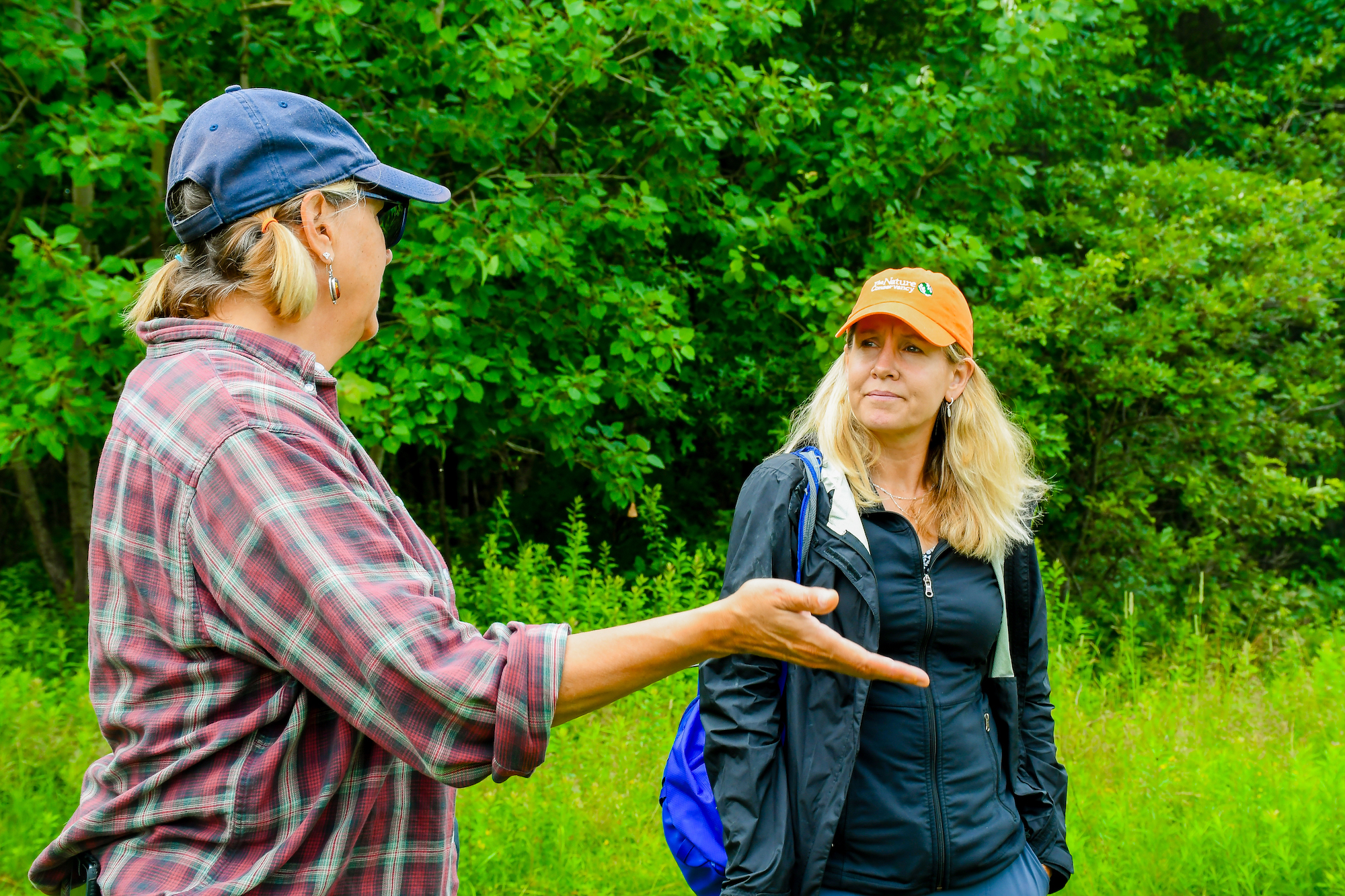
Beginning in 2008, Case’s focus turned to prescribed fire, which would become the defining hallmark of her career. As a proven tool for restoring forest health, prescribed fire allows TNC stewards to manage the natural process of fire on the landscape instead of preventing it. Controlled burning improves habitat for native plants and animals, maintains water quality and reduces the long-term risk of unplanned, out-of-control wildfires.
Prescribed burns are invaluable for conservation practitioners, but they require thorough planning in addition to intensive accreditation. Case began working her way through the trainings and over time became a highly skilled expert in the field. From 2008 to 2015, Case worked closely with PGC, leading fire training and burns across the state. She estimates that she put hundreds of their staff through fire trainings and says that “there’s not many PGC fire practitioners that started prior to 2017 that do not have my signature on at least one of their certificates.”
“I started my career with PGC in the fall of 2011 and participated in my first prescribed fire with Jenny in spring of 2012,” says Brian Williamson, PGC regional forestry supervisor. “My interest in fire really peaked after that day. I attended numerous trainings, both in the classroom and field, with Jenny instructing. After a couple years, I became interested in more leadership-like positions in fire. To this day, I’ll say that Jenny was one of my biggest supporters and was always there to provide both constructive criticism and praise that helped me build the confidence I needed.”
“The absolute highlight of my career was helping to build the partnership with the Pennsylvania Game Commission,” says Case. “I have made the best friends and had the best crew ever over the years burning with these guys. On top of that, being able to look at what they’ve continued to do with the program is awe inspiring. In my opinion, they are the best and most solid prescribed fire agency in the entire northeast United States.”
“Jenny is very passionate about the partnerships she’s formed with partners across Pennsylvania, and those partners are so appreciative of the effort she has put into them over the years,” says Kevin Yoder, director of land management for TNC PA/DE. “Key partners like the PGC would not have the advanced fire program they do now if it wasn’t for all the hard work Jenny and TNC’s fire program invested into training and leadership.”
Case was part of the small group of partners that drafted and pushed through prescribed fire legislation in Pennsylvania, which offers qualified practitioners additional liability protections under the “right to burn.” She has traveled to Michigan, Florida and numerous other locations to participate in workshops and wildland fire training sessions, becoming a highly respected fire leader in the region. In 2013 when Case became a qualified Burn Boss—the highest rank on a fire crew—she became and continues to be the only woman in fire leadership in Pennsylvania.
“For me, working in the natural resource field, and in particular fire management, has been an interesting and rewarding career,” Case says. “It is my hope that more women will see natural resource and fire management as an opportunity and that they find the support needed to make it the fulfilling career it can be.”
In 2012, Case and the TNC fire program began a lasting partnership with Penn State Arboretum by writing the burn plan and leading bi-annual burns to help restore their oak savannah. In 2014, she led the first 300-acre burn on State Game Land #55 and the first 500-acre burn on State Game Land #141. By 2022, after a three-year stint as the chair of the Pennsylvania Prescribed Fire Council, she began a partnership with Bureau of State Parks by writing burn plans and then leading the first-ever burn at Nescopeck State Park.
“Jenny’s leadership qualities, insight, passion for wildlife and their habitats, creativity and willingness to try something new are just a few of her characteristics that have left a lasting impact on wildlife and their habitats across the landscapes of Pennsylvania and beyond,” says Williamson. “She will be missed!”
She has already made an impression on the next generation of fire professionals, too. “Jenny fostered an atmosphere of inclusion, collaboration and just stick-to-it-iveness,” says Stephen Ruswick, land steward and fire specialist for TNC PA/DE. “It’s hard to pinpoint one memory because this could go for all of them, but at the beginning of every meeting [with Case], everyone would be smiling from joking around, and at the end of the meeting, everyone was smiling because we had a vision and achievable next steps.”
Quote: Jenny Case
It is my hope that more women will see natural resource and fire management as an opportunity and that they find the support needed to make it the fulfilling career it can be.
As she prepares to wrap up her TNC tenure, Case retires with one final milestone: working with the DCNR, the PGC and the Pennsylvania Prescribed Fire Council to successfully develop a Certified Prescribed Burn Manager program for Pennsylvania, which will create a pathway for landowners and individuals to safely conduct legally protected prescribed burning on private lands, making an important conservation tool more broadly accessible.
She’s looking forward to having more time to spend on her art, which has been increasingly in demand via private commissions, but fully intends to stay involved with the conservation community in northeast Pennsylvania. The new Hauser pole barn, which was renovated in 2023, features one of Case’s large mixed-media murals.
“Although it can be hard to tell when you’re in the thick of it, I believe we [partners involved with the PA Prescribed Fire Council] have achieved great things over the past 20-plus years. We have moved the ball in the right direction regarding prescribed fire in Pennsylvania,” Case says. “This next generation of fire practitioners gives me great hope that the work we started will continue and eventually—by using prescribed fire as the important management tool that it is—will be accessible to those who want to use it.”
We Can’t Save Nature Without You
Get global conservation news and the latest on local opportunities and projects.
